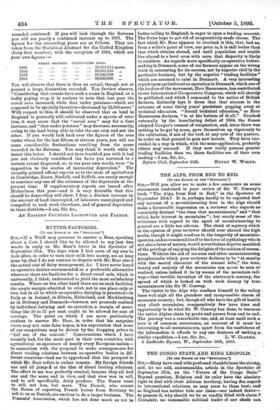BUTTER-FACTORIES.
[To TIM EDITOR OF TEE "SPECTATOR."]
Sta,—If a Wolff may presume to answer a Bear, speaking about a Cow, I should like to be allowed to say just two words in reply to Mr. Bear's letter in the Spectator of September 28th. The days when I had cows of my own to look after, in order to turn their milk into money, are so long gone by, that I do not venture to dispute with Mr. Bear about the actual cost of dairy management, Sze. I have never heard co-operative dairies recommended as a preferable alternative wherever there are facilities for a direct retail sale, which is universally, I think, understood to yield the most satisfactory results. Where on the other hand there are no such facilities, the ample margin admitted to exist, not in one place only or two, but in all in which co-operative dairying is practised—in Italy as in Iceland, in Siberia, Rhineland, and Mecklenburg as in Brittany and Denmark—between net proceeds realised by individual dairying and co-operation, a margin of some- thing like 30 to 35 per cent. ought to be allowed for cost of carriage. The point on which I am more particularly anxious to answer Mr. Bear, in order that his sanguine views may not raise false hopes, is his expectation that some of our competitors may be driven by the dropping prices to 'fall out of the contest." Conversations which I have recently had, for the most part in their own countries, with agricultural co-operators of nearly every European nation— in connection with the proposal to make arrangements for direct trading relations between co-operative bodies in dif- ferent countries—lead me to apprehend that the prospect to which Mr. Bear refers is rather remote. My foreign friends one and all jumpcd at the idea of direct trading relations. The effect to me was perfectly comical, because they all had one and the same end in view, and that view was to sell, and to sell specifically, dairy produce. The Danes want to sell, not less, but more. The French, who accuse the Danes of exporting French butter from Brittany to sell to us as Danish, are anxious to do a larger business. The Peasants' Association, which has not done much as yet in
batter-selling to England, is eager to open a trading account. The Swiss hope to get rid of co-operatively-made cheese. The fact which Mr. Bear appears to overlook is this, that, bad as, from a seller's point of view, our price is, it is still better than that which obtains abroad, and until population and wealth live abroad to a level even with ours, that disparity is likely- to continue. As regards more specifically co-operative butter- making in Denmark, some of our farmers appear on the wrong track in accounting for its success, not by superior skill in the- particular business, but by the superior "trading facilities' which are assumed to exist in Denmark. A very interesting report upon agricultural co-operation in Denmark, which one of the leaders of the movement, Herr Rasmussen, has contributed to our International Co-operative Congress, which will shortly-, be published, and which I commend to the notice of British farmers, distinctly lays it down that that success is the outcome of some thirty years' persistent pegging away at technical education. "Sound technical education," so Herr Rasmussen declares, "is at the bottom of it all." Crushed. externally by the humiliating defeat of 1864, the Danes- adopted Cowper's counsel of resignation, and, since there wa& nothing to be got by arms, gave themselves up vigorously to. the cultivation, if not of the turf, at any rate of the pasture, in order on that ground to gain new laurels. They have suc- ceeded in a way in which, with the same application, probably. others may succeed. If they now really possess greater trading facilities than we, those facilities are of their OVF/3 making —I am, Sir, &c., Reform Club, September 28th. HENRY W. WOLFF..






































 Previous page
Previous page